Úvod do děje
Přeletěli jsme doslova celý svět, abych žádal o práci u německého řezníka, na kterého s přehledem natrefíme 50 km od domova, jako vážně? To byly zhruba mé pocity, když jsem poprvé vstupoval do prodejny řeznictví BlackForest ve městě Tauranga. Obchod je prostorný, světlý a na první pohled se výrazně liší od klasických kiwi (novozélandských) prodejen. Dominantou jsou ještě pořád pulty s produkty váženými obsluhou, i když samoobslužný prodej vakuovaných produktů z regálů se nezanedbává. Doplňkový prodej fajnových sýrů nebo německých, holandských a všemožných jiných sušenek se nedá přehlédnout. Maso vidět není, takže se na výrobně klade důraz na výrobu masných produktů. To vše se mi honilo hlavou, když jsem se zase jakoby nic pohupoval za frontou zákazníků s životopisem v ruce.
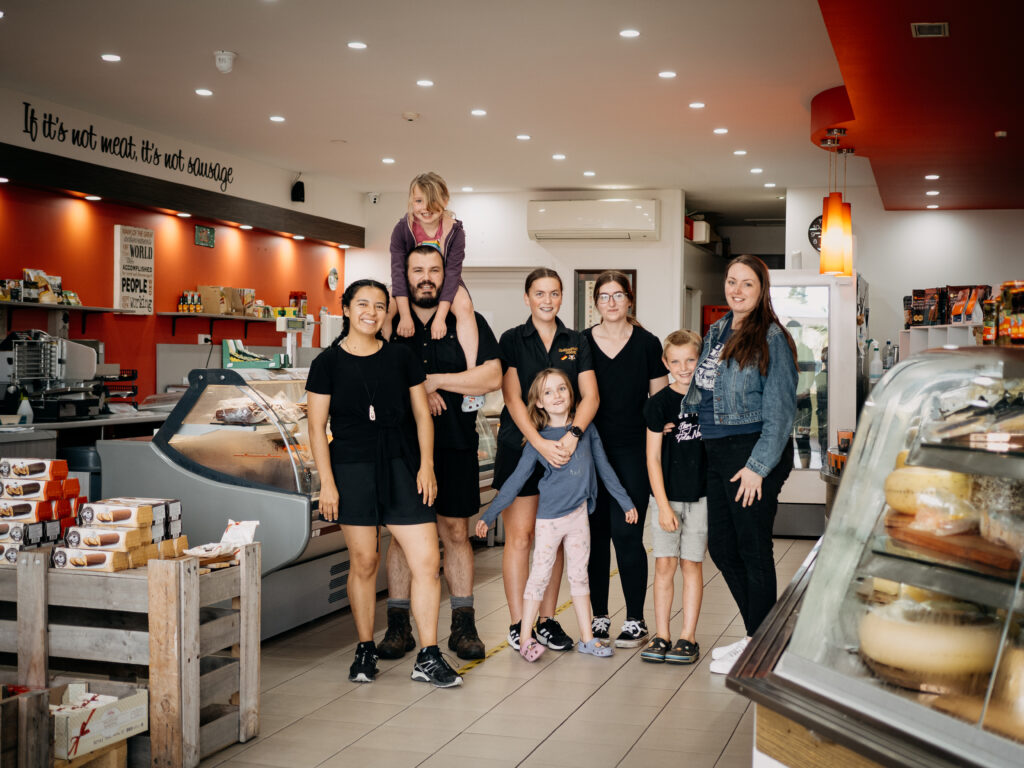
Milý vousatý chlapík v černé košili a zelených kraťasech mě okamžitě odhalil a rovnou se zeptal, jestli sháním práci a že zrovna hledá řezníka do výrobny. No to je gól. Vyměnili jsme si kontakty a řekli si další postup komunikace. Ještě předtím než se naše cesty na pár dní rozdělili, jsme od šéfa Robina Mücka dostali na cestu německou sekanou v housce. Naprostá deutsche klasika, která nám udělala obrovskou radost a paradoxně jsme si v tu chvíli připadali o dost blíž k domovu. A to nemluvím o Schinkensulze (německá varianta tlačenky) a uzeném špeku, které jsme si odnesli s sebou jako suvenýr.
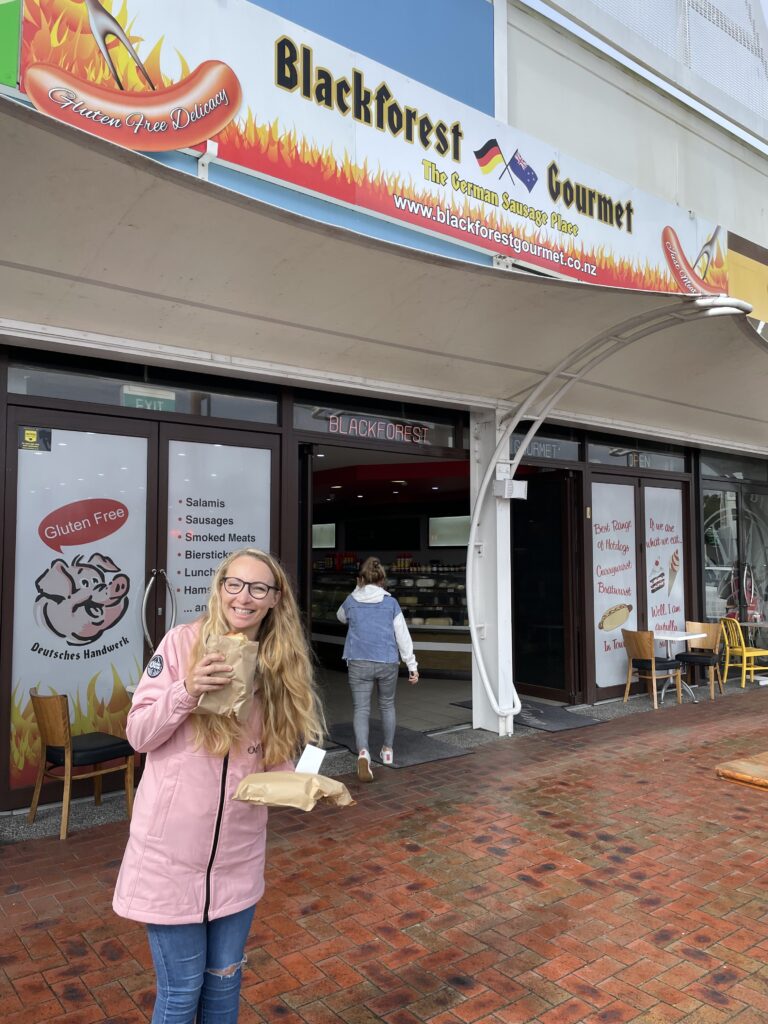
Od té chvíle bylo jasné, že do Taurangy se vrátíme, ale nejdřív musíme vrátit auto do Aucklandu, vyčkat tam na zbylé dokumenty a pak se přemístit zpět. Dalším krokem bylo rozhodnutí o podpisu smlouvy s německým nebo anglickým řezníkem. Veškeré plusy nakonec hrály pro německého, a proto jsem 18.9.2023 oblékl firemní overall firmy BlackForest v průmyslové zóně poblíž Mount Manganui, kde se nachází prostory bourárny a výrobny.
Trocha historie
Firma BlackForest byla založená Berndem a Michaelou Mückovými v prosinci 1999. Zakladatel Bernd Mück pochází z rodiny řezníků a hostinských ze Stuttgartu. Největší sranda je, že jeho děda se jmenoval Josef Vala a provozoval rodinné řeznictví právě tam. Josefova dcera Gertrude Vala (Berndova matka) byla první řeznicí, která dostala výuční list po druhé světové válce v regionu Baden Wurttenberg. Po válce se vdala za hostinského Mücka, který přišel do Stuttgartu z tou dobou problematických Sudet. Může to vůbec být náhoda?
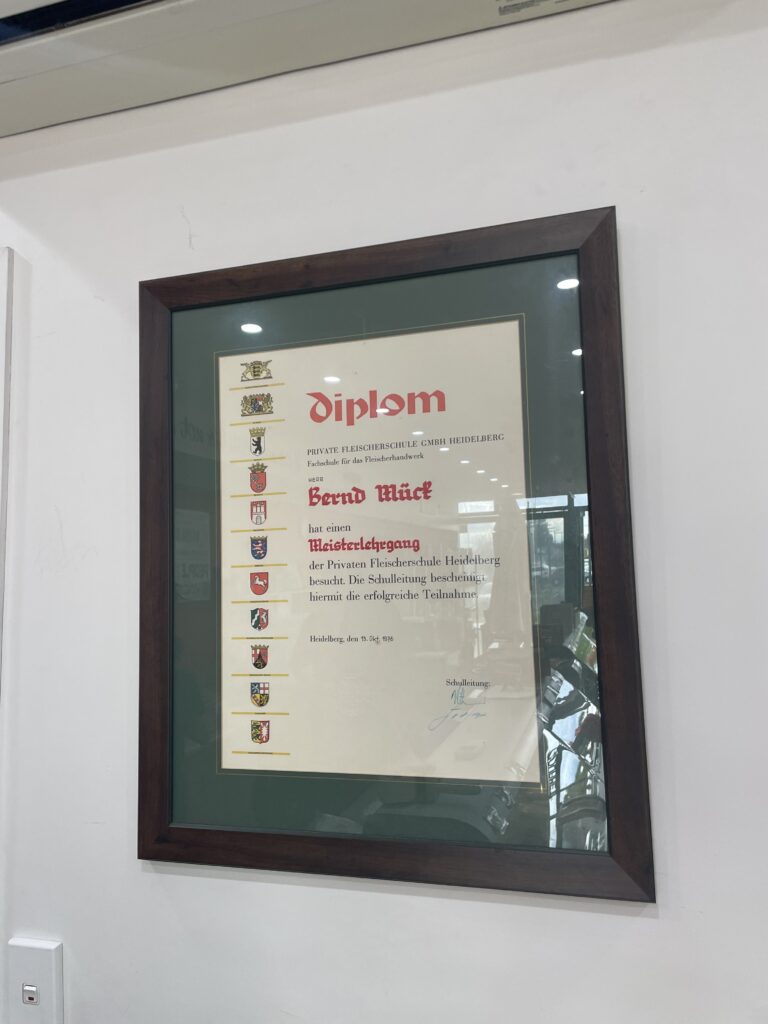
Bernd úspěšně prošel řeznickými školami v Německu sedmdesátých let, ale v době, kdy se společně se svou ženou Michaelou rozhodli opustit Německo, prodávali jimi úspěšně vybudovanou přepravní společnost v Neckartailfingenu. Plánem se bylo dostat do vysněné Austrálie, kterou předtím již párkrát navštívili, a začít tam nový život. Protože Austrálie nebyl hned tak snadný cíl pro usazení, rozhodli se to vzít přes novozélandské město Nelson, kde se měli v plánu na pár let usadit a získat tam správná víza pro přelet do Austrálie.
Bernd se nechal zaměstnat u tamního řezníka, který přirozeně dělal novozélandskou řezničinu. Tam zjistil, že mu na Zélandu začíná chybět klasická německá uzenářská výroba a rozhodl se to změnit. Pro začátek businessu se potřeboval s rodinou přemístit blíž k Aucklandu nebo někam, kde bude větší poptávka po zboží. Rozhodli se tedy pro přestěhování do stále se rozpínající Taurangy, našli pronájem vhodných prostor a rozjeli výrobu v Chapel street. Ačkoli moje angažmá už se konalo na jiné adrese, receptury, jméno i pověst firmy zůstaly stejné.
Synové střídají otce
Chvíle Robina Mücka, syna Bernda a Michaely, který už jako šéf firmy nabíral mě, přichází v roce 2017. Robin po letech strávených na studiích začal kariéru v alkoholovém průmyslu, kde končil po deseti letech práce jako úspěšný manažer 2 liquor shopů (na NZ se zejména tvrdý alkohol prodává jen ve specializovaných obchodech). 1.1.2017 se ze dne na den stal členem teamu v obchodu BlackForest v Tauranze, který měl se svou ženou Alanou na starost až do roku 2023. Tento rok odešel do důchodu Bernd s Michaelou, což pro Robina a Kevina znamenalo převzít výrobnu s bourárnou, kterou do té doby řídil otec. Podle mého názoru patří obdiv lidem, kteří se zhostí své úlohy, aniž k tomu mají řemeslné vzdělání a dokážou se s pokorou soustředit na získávání praxe s nožem, u mašin a k tomu všemu řídit podnik, starat se o zaměstnance, věnovat se manželce a třem dětem a tak dál. Mimo to všechno je Robin stále pozitivně naladěn a působí naprosto neoblomně.
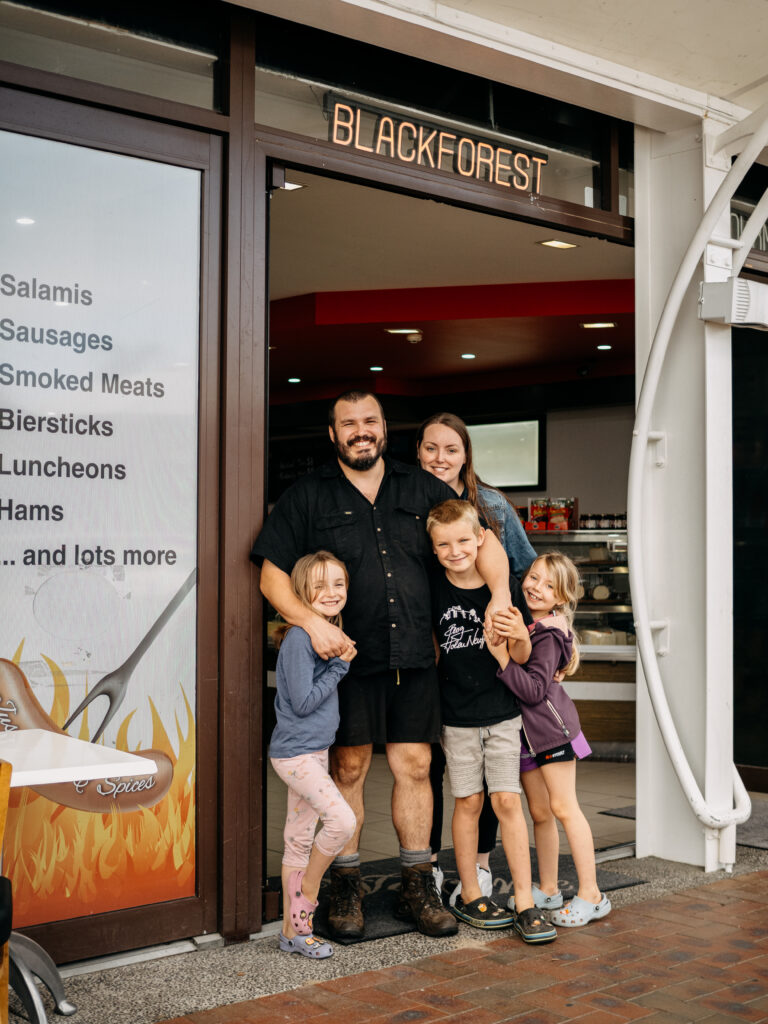
Kromě Robina jsou stálými členy týmu řeznicko-uzenářské dílny jeho bratr Kevin, který se v době mého působení zabýval řeznickým řemeslem v rámci BlackForest už 15 let a v ne vždy jednoduché roli vedoucího a jednatele výrobny si vede víc než dobře.
Vlastní plán kontroly potravin, které má mimojiné Kevin na starosti je nejvyšší standard NZ pro podniky vyrábějící potraviny. Zajímavostí společnosti Blackforest je, že vyrábí fermentované salámy (tzv. UCFM – Uncooked Comminuted Fermented Meat), které jsou trvanlivé a nepotřebují chlazení, paštiky včetně jater a také veškeré vařené výrobky. Na NZ se často objevují příklady podniků, které vyrábějí jednu z těchto činností, ale jen velmi zřídka vyrábějí všechny tři.
Dalším dlouholetým stavebním kamenem firmy je německý řezník Gunnar Peutz, který přiletěl na Nový Zéland před 16 lety na inzerát Bernda Mücka a od té doby je tenhle parťák nepostradatelnou silou nejen na pozici u narážky, ale celkově se díky jeho rychlosti a obratnosti dodělá vždy vše včas a správně. A ještě zbyde čas na pivo!
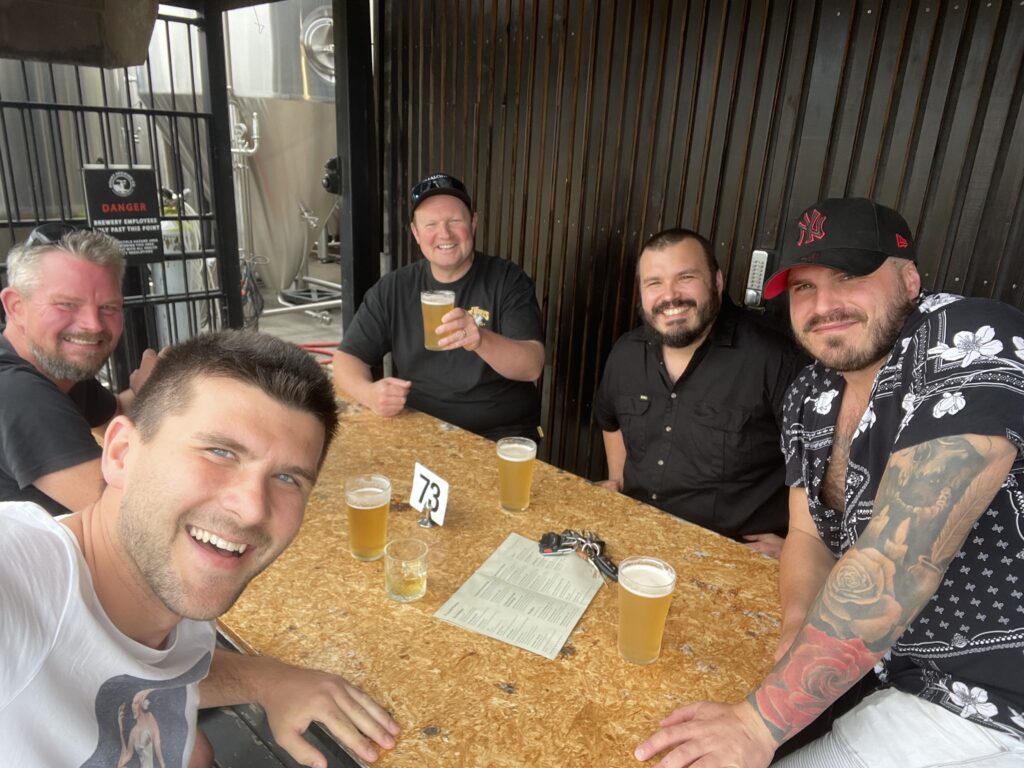
Na online svět se nesmí zapomenout
Black Forest dílna má jasný týdenní harmonogram, který se mění jen málokdy. Mojí úlohou, kterou jsem zdědil po sympatickém řezníkovi Deanovi, bylo zejména zpracovávání objednávek pro obchod v Tauranze, franšízu v Aucklandu a mnoho dalších zákazníků napříč Novým Zélandem. Mimo tyto přípravy jsem byl k dispozici jako bourač svinských půlek nebo jako případný pomocník u narážky, kutru, kotle, udírny nebo řezačky. Těchto 5 strojů jsou základními kameny výrobny, která své výrobky může NZ poštou poslat v krabici s ledem až 1500 km daleko.
Díky BlackForest jsem totiž trochu pronikl do světa online řeznického prostředí, které na Novém Zélandu vzkvétá. Díky přepravním společnostem operujícím přes noc je totiž povoleno posílat dokonce výrobky, které v Česku vyžadují chlazené kurýry, obyčejnou dodávkou. Veškerou odpovědnost za to, zda zboží zůstane chlazené od předání kurýrovi výrobcem až po předání zásilky zákazníkovi, má odesílatel. Je tedy na něm, jaké prostředky a izolace v závislosti na typu posílaného výrobku použije, protože v případě, že zaslané zboží přijde zákazníkovi v nevyhovujícím stavu, byť třeba vinnou přepravce, náhradu hradí odesílatel. Běžně to ale funguje velice dobře a všechny tři strany jsou s takovýmto typem businessu spokojení.
Jak to chodí na výrobně
Pondělí je výrobní den, kdy je úkolem 4členného teamu dílny splnit mnohdy náročné požadavky obchodů a velkoobchodních zákazníků. Škála výrobků je velmi široká. Od Aufschnittů jako je Jagdwurst, Lyoner nebo Smoked Bierwurst přes vařené Duryňské Bratwursty, Mnichovské Weisswursty, Norimberské klobásky až po Frankfurtské a Debrecínské párky, oblíbené Kransky, Bockwursty až po trvanlivé výrobky typu Landjaeger, Pepřové a Paprikové klobásky nebo Peperonni salámy. V sortimentu nechybí ani již zmíněná Leberkäse, Schinkesülze nebo Zwiebelmettwurst.
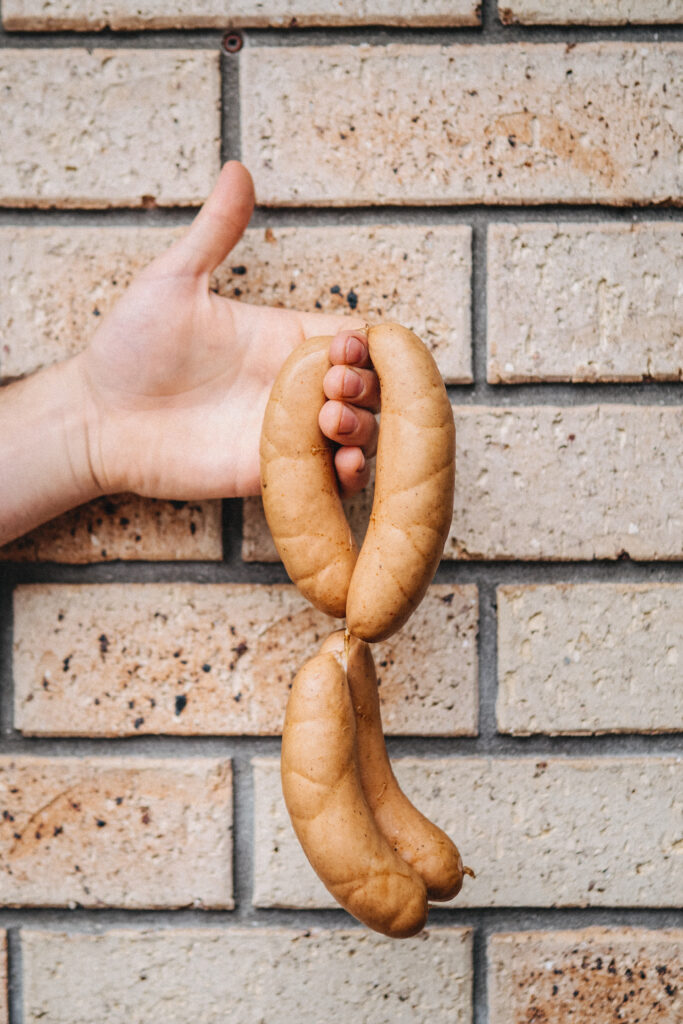
Úterý je den bourací, kdy se kostí obvykle 10 svinských půlek, a to německým stylem, tedy škrábání kostí do běla. Svinské a někdy i kančí maso je na Zélandu jednak přirozeně levnější, ale je i tučnější a méně vodnaté, což znamená vhodné pro výrobu trvanlivějších klobás a salámů například. Mimo půlky se kostí kýty upravované pro výrobu takzvané zauzené Meisterschinken. Jako hovězí maso do výroby používají chlapi hovězí zrcátka a bryndáčky bourané v tempu udávajících podnicích Nového Zélandu (masa pupků).
Středa je obvykle dnem pro výrobu Aufschnittů, šunek a kompletováním objednávek pro velkoobchodní odběratele jako je například fajnový supermarket specialit Moore Wilson ve Wellingtonu nebo bistro českých majitelů Cafe Berlin v Christchurch.
Čtvrtek je opět dnem velké výroby a kompletování objednávek do obchodů, aby byly dostatečně zásobené na víkend a pátek je dnem trvanlivých výrobků, kterých se dělají stovky kil například pro novozélandskou ligu pivního ping pongu.
Zároveň je pátek jako obvykle dnem uklízecím, vakuovacím a zboží v lednici se pofackuje tak, aby ve zdraví přežilo víkend. Když je vše hotovo, obvykle zacinkají třetinkové lahve s pivem. Je důležité vědět, že vás na Novém Zélandu policie nepřipraví o papíry, když si v pátek po práci dáte třetinku pivka. Limitem jsou tu pro ně totiž 2 drinky, což jsou v praxi cca 2 třetinky pivka kolem 4%.
Jsem moc vděčný za tuto první pracovní zkušenost na Novém Zélandu. O tom, čeho se mi v rámci této nabídky podařilo dosáhnout, se dozvíte brzy v článku o prvním českém Gothajském salámu na Novém Zélandu! Danke Schon chlapi a třeba se příště uvidíme v Čechách až přijedete do Evropy navštívit své německé příbuzné.
AN ARTICLE IN ENGLISH
Introduction to the plot
We’ve literally flown across the world to apply for a job with a German butcher we can easily find 50 km from home, like really? Those were roughly my feelings when I first walked into the BlackForest butcher shop in Tauranga. The shop is spacious, bright and, at first glance, distinctly different from the classic Kiwi (New Zealand) shop. The dominating feature is still the counters with produce weighed down by the staff, although the self-service sale of vacuum-packed produce from the shelves is not neglected. The complementary sale of fine cheeses or German, Dutch and all manner of other biscuits is not to be overlooked. Meat is not visible, so the emphasis on the production floor is on meat products. All of this was on my mind as I was once again swaying behind a line of customers, resume in hand.
A nice bearded guy in a black shirt and green shorts immediately discovered me and asked me straight away if I was looking for a job and that he was looking for a butcher to work in the factory. Well, that’s a goal. We exchanged contacts and told each other the next line of communication. Before our paths parted for a few days, we got a German meatloaf in a bun from our boss Robin Mück. A total deutsche classic that made us very happy and ironically made us feel a lot closer to home at that moment. Not to mention the Schinkensulze (a German version of Tlacenka) and smoked bacon that we took away as a souvenir.
From that point on it was clear that we would return to Tauranga, but first we would have to return the car to Auckland, wait for the rest of the documents to arrive and then move back. The next step was to decide whether to sign a contract with a German or English butcher. All the pros eventually played in favour of the German, and so on 18 September 2023 I donned the BlackForest corporate overall in an industrial area near Mount Manganui, where the factory is located.
A little history
BlackForest was founded by Bernd and Michaela Mück in December 1999. The founder Bernd Mück comes from a family of butchers and innkeepers from Stuttgart. The funny thing is that his grandfather was named Josef Vala (common Czech name) and ran the family butcher shop there. Josef’s daughter, Gertrude Vala (Bernd’s mother), was the first butcher graduate from her apprenticeship certificate after World War II in the Baden Wurttemberg region. After the war, she married the innkeeper Mück, who had come to Stuttgart from the then troubled Sudetenland. Could this be a coincidence?
Bernd went through butchery schools in Germany in the 1970s graduating with a Meisterbrief but by the time he and his wife Michaela decided to leave Germany in 1998, they were selling the shipping company they had successfully built up in Neckartailfingen. The plan was to get to their dream Australia, which they had visited a few times before, and start a new life there. Since Australia was not an immediately easy destination to settle in, they decided to take it through the New Zealand town of Nelson, where they planned to settle for a few years and get the right visas to fly to Australia.
Bernd got a job with a local butcher who naturally did New Zealand butchery. There he found that he was beginning to miss the classic German sausage making in NZ and decided to change that. To start the business he needed to relocate with his family closer to Auckland or somewhere where there would be a greater demand for the goods. So they decided to move to the still-expanding Tauranga, found a suitable rental space and started production in Chapel street. Although my engagement had already taken place at a different address, the recipes, the name and the good reputation of the company remained the same.
The sons take over from the father
The moment for Robin Mück, son of Bernd and Michaela, who was already recruiting me as head of the company, comes in 2017. After years spent at university, Robin started his career in the liquor industry, ending up as a successful manager of 2 liquor stores (in NZ, hard liquor in particular is only sold in specialty stores). On January 1, 2017, he joined the team at the BlackForest store in Tauranga with his wife Alana. This year, Bernd and Michaela retired, which meant for Robin and Kevin to also take over the factory, which until then was run by their father. In my opinion, you have to admire people who take on their role without having a trade background and can concentrate with humility on getting experience with a knife, at the machinery and on top of that running a business, looking after the staff, looking after a wife and three children and so on. Aside from all that, Robin is always positive and comes across as completely unflappable. His brother Kevin had been learning to master his trade for the past 15 years straight out of school and has learned to fill the production and complicated compliance management role extremely well. Together they ensure the business runs as smooth as butter. Blackforest Gourmet Enterprises runs under an MPI (Ministry for Primary Industries) Custom Food Control Plan. This means the business has had to create its own policy and rules around every aspect of production, cleaning, packaging etc. and be laboratory tested to be producing safe food and audited periodically. This arduous paperwork is all part of Kevin’s role as Robin is still learning the machines.
A custom food control plan is NZ’s highest standard for food producing businesses. One of the interesting things about Blackforest is that they produce fermented salami (called UCFM- Uncooked Comminuted Fermented Meat) to a shelf stable standard needing no refrigeration, Pate including Liver, as well as all the cooked goods. Often in NZ there are examples of businesses which do one of these but very very rarely do they produce all three.
Apart from Robin, his brother Kevin and long-time employee Gunnar Peutz, who came to New Zealand 16 years ago (written in 2024) at the advertisement of Bernd Mück and has been another cornerstone of the company ever since. Gunnar brings a wealth of knowledge and experience to round out the team well and is a master at the filler and keeping all the timing of the production floor running smoothly.
The online world must not be forgotten
Black Forest Workshop has a clear weekly schedule that rarely changes. My role, inherited from the likeable butcher Dean, was mainly processing orders for the Tauranga store, the Auckland franchise and many other customers across New Zealand. Outside of these preparations, I was available as a sow’s half boner or as a possible helper at the bowl chopper, cooker, smoker or fill machine. These 5 machines are the cornerstones of a factory that can mail its products to NZ in an ice box up to 1500 km away.
In fact, thanks to BlackForest, I got a little insight into the online butchery world that is booming in New Zealand. Thanks to overnight shipping companies, even products that require refrigerated couriers in the Czech Republic are allowed to be sent by regular delivery. All responsibility for ensuring that the goods remain chilled from the time they are handed over to the courier by the manufacturer to the time they are handed over to the customer rests with the sender. It is therefore up to them what means and insulation they use, depending on the type of product being sent, because if the goods sent to the customer arrive in a substandard condition, even if it is the fault of the courier, the sender will be liable for compensation. However, it normally works very well and it looks like all three parties are happy with this type of business.
How it works on the factory floor
Monday is a production day, when the 4-person workshop team is tasked with meeting the often demanding requirements of the shops and wholesale customers. The range of products is very wide. From Aufschnitt such as Jagdwurst, Lyoner or Smoked Bierwurst to cooked Thuringer Bratwurst, Munich Weisswurst, Nuremberg sausages to Frankfurter and Debrecen sausages, the popular Kransky, Bockwurst to long-lasting products such as Landjaeger, Pepper and Paprika salami or Peperoni salami. The range also includes the aforementioned Leberkäse, Schinkesülze and Zwiebelmettwurst.
Tuesday is the day of the boning, when 10 halfs of sows are usually boned by German style, i.e. scraping the bones white. Sow and sometimes boar meat is both naturally cheaper in NZ, but it is also fattier and less watery, which means it is suitable for making more durable sausages and salami, for example. Outside of the halfs, the leg bones are treated to produce what is known as a ‚smoked Meisterschinken‘. The guys use beef flap and flank cuts in pace-setting New Zealand plants (meat navels) as beef for production.
Wednesday is usually the day for making Aufschnitt, hams and completing orders for wholesale buyers such as the fine speciality supermarket Moore Wilson in Wellington or the Czech owners‘ bistro Cafe Berlin in Christchurch.
Thursday is again a day of big production and order picking for the shops to be sufficiently stocked for the weekend and Friday is a day of durable products, hundreds of kilos of which are made for the New Zealand beer pong league, for example.
At the same time, Friday is, as usual, a day of cleaning and vacuuming, and the goods in the fridge are packed to make sure they survive the weekend in good conditions. When all is done, the third-ounce bottles of beer usually clink. It’s important to know that in New Zealand, the police won’t strip you of your papers if you have a small beer after work on a Friday. The limit for them here is 2 drinks, which in practice is about 1 big beer in Czech at around 4%.
I’m very grateful for this first work experience in New Zealand. You’ll hear more about what I was able to accomplish with this offer soon in the article about the first Czech Gothai salami and Spekacky in New Zealand! Danke Schön guys and maybe next time we’ll see you in the Czech Republic when you come to Europe to visit your German relatives.
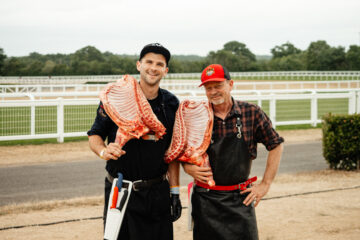

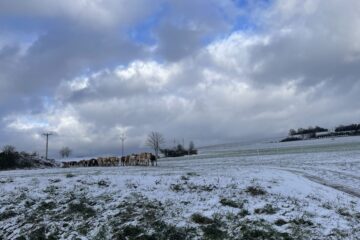
Počet komentářů: 0